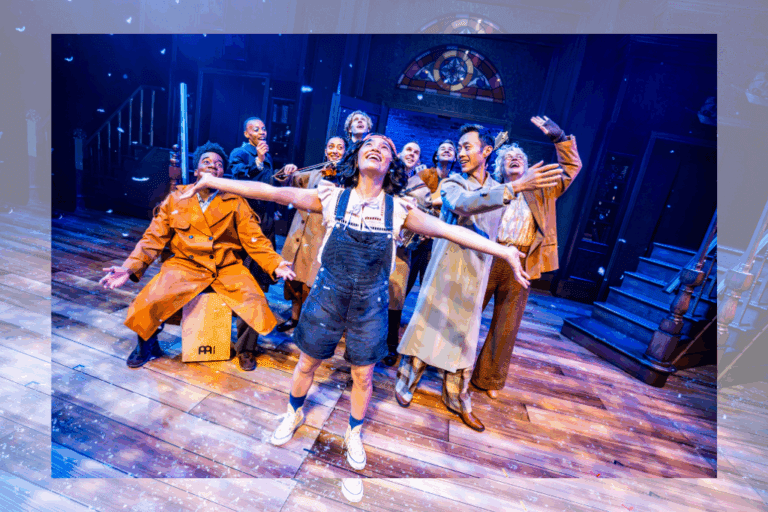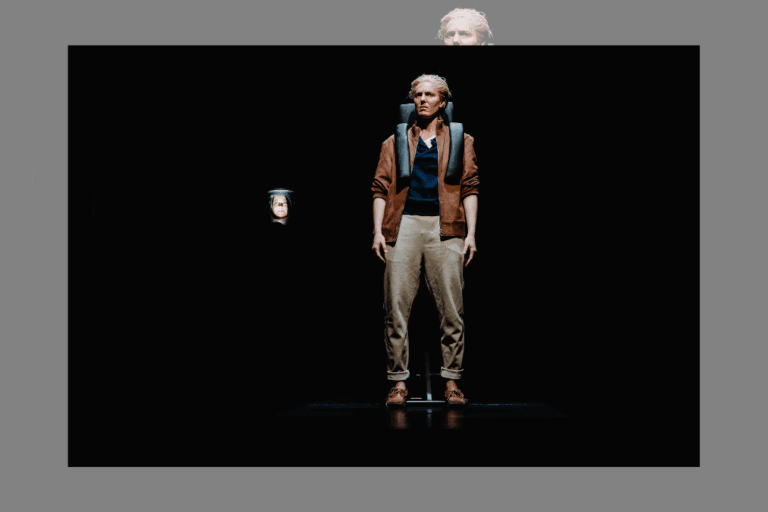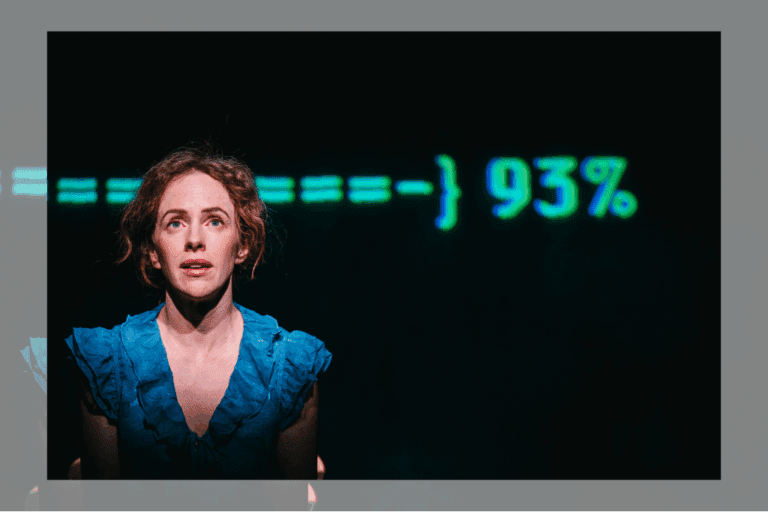REVIEW: Bone Cage at The Assembly Theatre/One Four One Collective
Content warning: this review contains mention of suicide, alcoholism, sexual assault, generational trauma, child death, violence, and homophobia.
“I’m a broken man!” shouts Clarence, the troubled father figure of Catherine Banks’ Bone Cage.
This line, delivered in anguish by Jimi Shlag in The Assembly Theatre’s current run of the play, perfectly encapsulates the themes of every character in this heart-wrenching story.
In Cass Van Wyck’s directorial debut of Banks’ Governor General Award-winning play, Bone Cage tells the story of several young adults in rural Nova Scotia. The plot closely follows anti-hero Jamie (Daniel Reale) as he navigates his challenging family life. Clarence (Shlag), Jamie’s father, is hung up on his late son Travis; Chicky (Kaitlin Race) is his obstinate and irate half-sister; and Krista (Jessi Elgood) is Jamie’s naive fiancée who just wants to get married and start their life. Throughout the play, we not only learn about Jamie’s distress in clear-cutting the environment he cares for and his attempts to save injured wildlife after his shifts, but also the extreme sense of isolation, loneliness, and hopelessness of all the characters. Jamie is pining for a way out of his current life, while also grappling with the lack of opportunities to get him away, opting instead to marry 17-year-old Krista for something to distract him.
Banks’ characters capture the boredom of being trapped in a rural small town, often seen just hanging around the forest, the swimming hole, or one of their living rooms. And a six-pack of beer is never far from sight. Repeatedly, characters (often, Jamie) throw around pipe dreams of moving to the other side of the country to find success in a new job, either vaguely encouraged by Chicky — who is also keen to leave but is entangled in marital affairs and complex family relationships — or dismissed by Krista, who doesn’t see the point or attraction in leaving the life they already know.
Reale, playing Jamie, skillfully encapsulates the transition of boy to adult by expressing a combination of irritating, dismissive, and even aggressive tendencies, while other times joking casually with his friends. And yet, the pain beneath his outward hostility is evident without being explicit. Race’s Chicky embodies the stoicism of the child-turned-matriarch in her world of unloving men. Shlag portrays the challenges of being a parent through Clarence exceptionally well, highlighting the grief of losing a child. Even smaller characters, such as Robby (played by Atlin Hofer), beautifully reflect the rude and dismissive attitude society has towards the concept of difference, and how an individual must grapple with that rejection their whole life.
Part of what draws the audience into the story is the excellent space offered by The Assembly Theatre. Set designer JB Nelles has done a wonderful job creating a realistic, practical backdrop despite the venue’s intimacy. The audience sits right in front of the actors, which again brings you into the story in a very direct way. The black stage has been transformed into a sod-covered forest floor, surrounded by a boardwalk and scattered with tree stumps — when characters are alone in the forest with their thoughts, the audience is there, too. But in quick transitions to the living room, a table unfolds out of the boardwalk, stumps become stools, and a tree spins around to reveal an armchair in front of a TV. Nelles certainly does not let the lack of space hinder their creativity.
I would caution any theatregoers to prepare emotionally before attending this show. Having read a synopsis prior to the performance, I was expecting some upsetting themes in the play, but nothing could have quite prepared me for the extreme trauma of Bone Cage. As the characters navigate their grief, hopelessness, and desire to find meaning in their lives, audiences are witness to alcoholism treated casually, homophobic language, physical violence, sexual assault on minors, child death, and suicide. Shlag’s Clarence excellently represents a spiraling grief, as he attempts to engage his children (and really, anyone who will listen) in his plan to clone and resurrect his dead son, Travis, claiming new technology and science in far-off Florida or Scotland will bring him back. From having artist renditions of Travis at his present age if he were still alive, to clandestine and destructive attempts to retrieve Travis’s DNA for cloning, Clarence grips onto any form of hope he can find, no matter how slim.
Although these graphic scenes help to convey the traumatic and intense experiences of these young adults, it is upsetting to watch unfold before you. The honesty and transparency in Bone Cage allows audiences to become a part of the characters’ stories and engage with their pain in a very personal way. Although some of the tragedies happen offstage and are only discussed in the play, the grief, pain, and longing of the characters is raw and present onstage for audiences to engage with.
There were certain moments throughout the two-hour performance where lines were fumbled over or spoken so quickly that I didn’t understand them, and some transitions between scenes were delayed due to props, but the high quality of acting and direction of these complex characters outweighed these minor opening night glitches.
Bone Cage reflects the challenges of being alive and being misunderstood, and how tragedy doesn’t hold back no matter your life’s circumstance. The sense of isolation reflected through all the characters embodies the loneliness of growing up in a rural environment with few options for one’s life. The relentless tragedy of the production immediately assimilates the audience into the story, though its intensity feels alarming and excessive at times, particularly in terms of certain harsh language choices. Nevertheless, it is a remarkably impressive production in a limited space — just don’t go in expecting any sense of joy. Be prepared for extreme descriptions and enactments of countless abuse, violence, and trauma.
Bone Cage runs at The Assembly Theatre through May 5–20, 2023.
Intermission reviews are independent and unrelated to Intermission’s partnered content. Learn more about Intermission’s partnership model here.













Comments